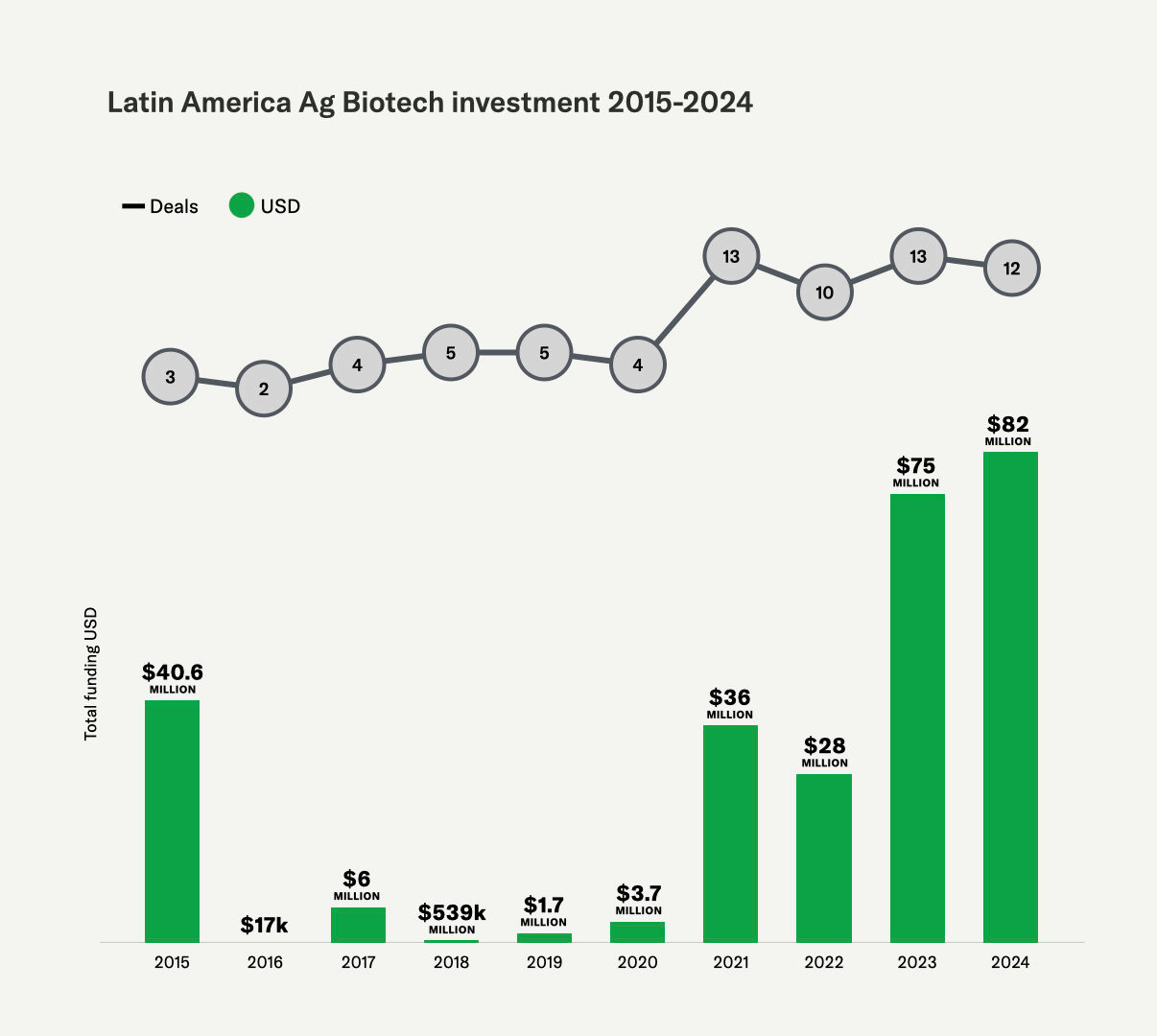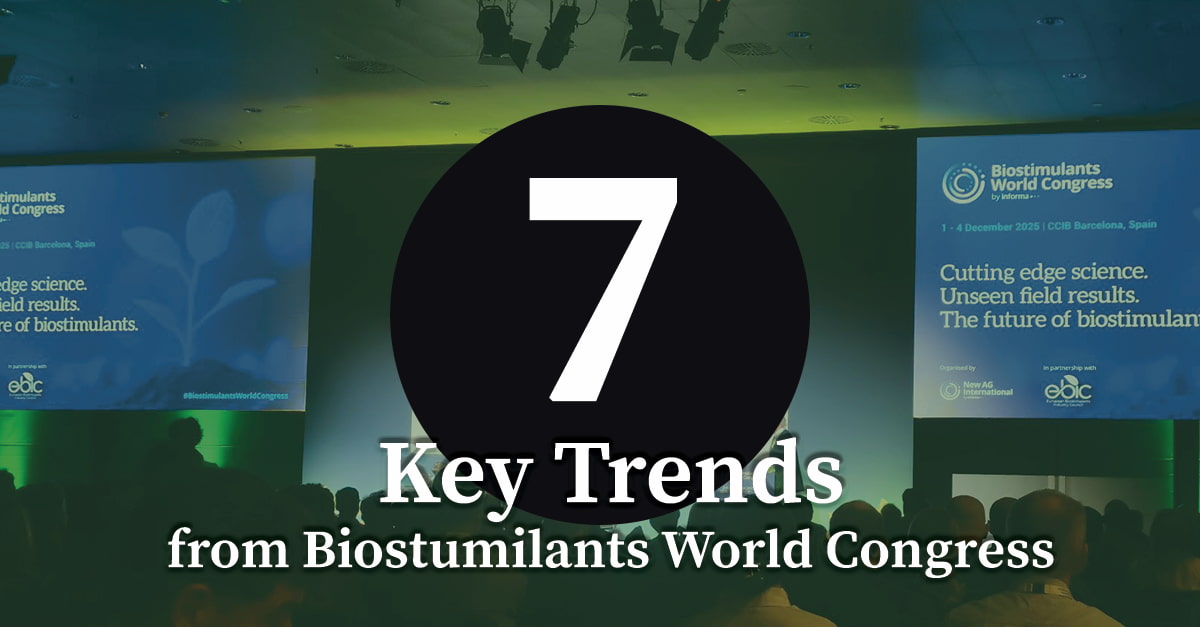In today’s world, you can’t name global agriculture players without mentioning Brazil and Argentina. Not only are they in the top three countries for corn and soybean production, but Brazil is well known for farmer adoption of biologicals. Many agricultural innovation trends in LATAM make it an ideal market for commercialization and a place to look for insights and learnings to apply to other regions. From the early stages of strategic business planning, portfolio assessments and market prioritization through the intensive regulatory and product development phases, companies are looking to LATAM for expansion as well as optimizing their testing programs.
Biocontrols and Biostimulants Adoption Increasing
As a tropical climate, Brazil has a heightened need for biocontrols to combat resistance to conventional chemical pesticides. As such, venture capital investment into LATAM biotech startups, including mostly biologicals, is on the rise.

In Brazil, especially, biocontrols are used in rotation or combination with other inputs as essential tools to solve problems in the tropical, high pest pressure environments that can have multiple crop cycles, and adoption continues to grow. But Brazil is not the only focus, Argentina, Chile, Mexico and Colombia are also active in the development of innovative pest controls and crop inputs.
Precision is key when trialing biocontrols and biostimulants because their mode of action or effects may be more subject to environmental, soil, or pest conditions during the season compared to conventional chemistries – the ultimate goal is finding the optimal “program”, not product. The potential for products containing metabolites derived from biologicals, but without the microorganism itself, offer the benefit of fewer compatibility issues with chemical products.
Research trials are imperative to develop robust, credible performance data that companies need to correctly position across environments and management practices and that farmers need for adoption. Brazil proves bio-inputs succeed when they’re practical, proven and integrated with the current farm practices. Other regions can replicate this by focusing on farmer-centric solutions, local validation, and systemic compatibility.
Trait Focus
Corn transgenic trait effectiveness is decreasing as resistance increases, especially in Brazil, and farmers are looking to conventional chemistries and biologicals to replace the control. Safe, new modes of action are needed to help provide a holistic approach to pest management and help increase the market life of new traits and traditional products.
More novel, complex transgenic traits are being tested in row crops to increase drought tolerance and photosynthesis, among others. These approaches require an intensive phenotyping effort for a proper characterization under the right environments, following the required regulatory biosafety regulations of each geography.
Evaluation of New Technologies for Critical Subtropical Diseases and Pests
Asian Soybean Rust (ASR) has been an issue for decades, especially in LATAM. Despite the many crop protection products developed to control the disease, many issues continue. The need for more control options has driven development in soybean varieties and crop protection products, including biological, conventional chemistries and RNAi.
As an example for some new products, the AgriThority® recommended development approach has consisted of starting with a quick bioassay in Paraguay and Brazil encompassing several rust strains. It’s aimed at a first, high-level assessment of product rates and modes of use, and it’s been followed immediately by field trials in both countries. This approach helps develop these products more quickly while retaining the accuracy and credibility of the data.
Black Sigatoka in Banana and Other Specialty Crops
AgriThority® works actively in Brazil, Ecuador and Mexico in conducting research aimed at finding new, safer modes of action into the problematic disease – Black Sigatoka. The overall approach to testing is similar to that for ASR – start with quick bioassays that help narrow down to the most effective treatment combinations when reaching the more demanding and expensive field-scale experimentation.
AgriThority® has evaluated a wide variety of new products for these two critical diseases, among others, over the years. Results are variable and range from null to commercially relevant disease control. A key learning is that it is very difficult to predict product efficacy based on results from other diseases and geographies, especially from temperate climates. Starting specific for a first round of evaluation highly increases the overall efficiency of the testing program. In some cases, this approach has helped scale up from a discovery stage to a precommercial evaluation in combination with conventional technologies.
When working with new technologies, credibility of data is key – traditional approaches for evaluation of conventional technologies may not adapt correctly for biological products or new modes of action with a less drastic effect. The AgriThority® network of experimentation in LATAM covers a broad range of crops both row-crop scale and specialties including fruit trees, grapes and horticultural crops both at open field and greenhouse scale in Brazil, Argentina, Chile, Uruguay, Paraguay, Ecuador and Mexico. In all of these countries, AgriThority® has established optimized protocols for both biopesticides and biofertilizer-biostimulant type products with a strong focus on the generation of objective assessments.
LATAM Product Expansion into Other Markets
LATAM companies with well-established products are finding success with expansion into other countries in the region, the U.S. and Europe. A strategic and scientific plan is necessary to ensure portfolios are assessed and prioritized, target markets are understood, and products are properly developed and registered for the target region.
Tap into the expansive AgriThority® agricultural business, market and product development, as well as regulatory, expertise for local impact and preferences across major crop production regions of the world, including LATAM countries. As an independent international agricultural strategic and scientific consultancy, AgriThority® has conducted more than 1,500 projects in more than 31 countries, including nearly every LATAM country, and nearly every crop. Reach out for more information today.


